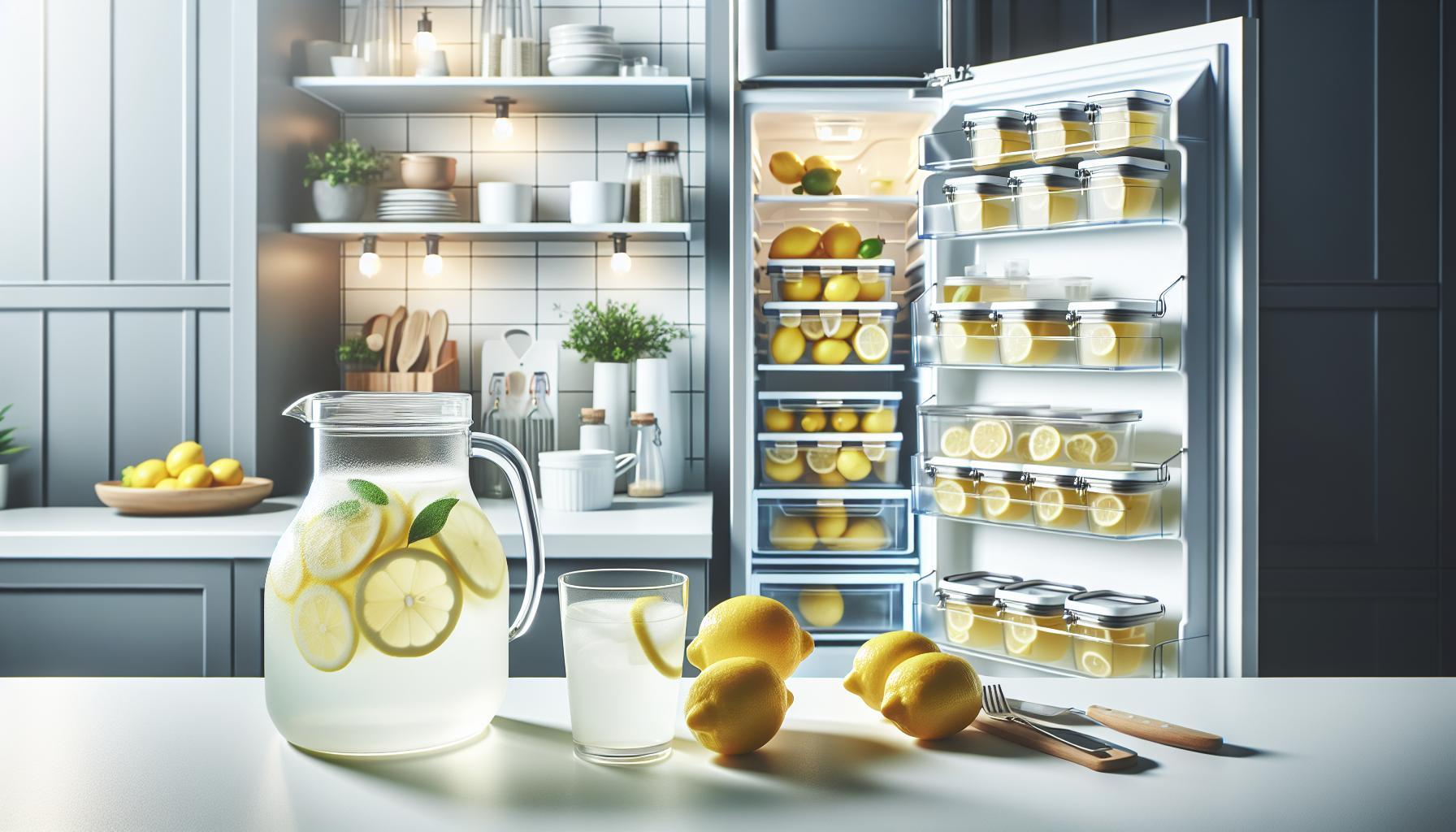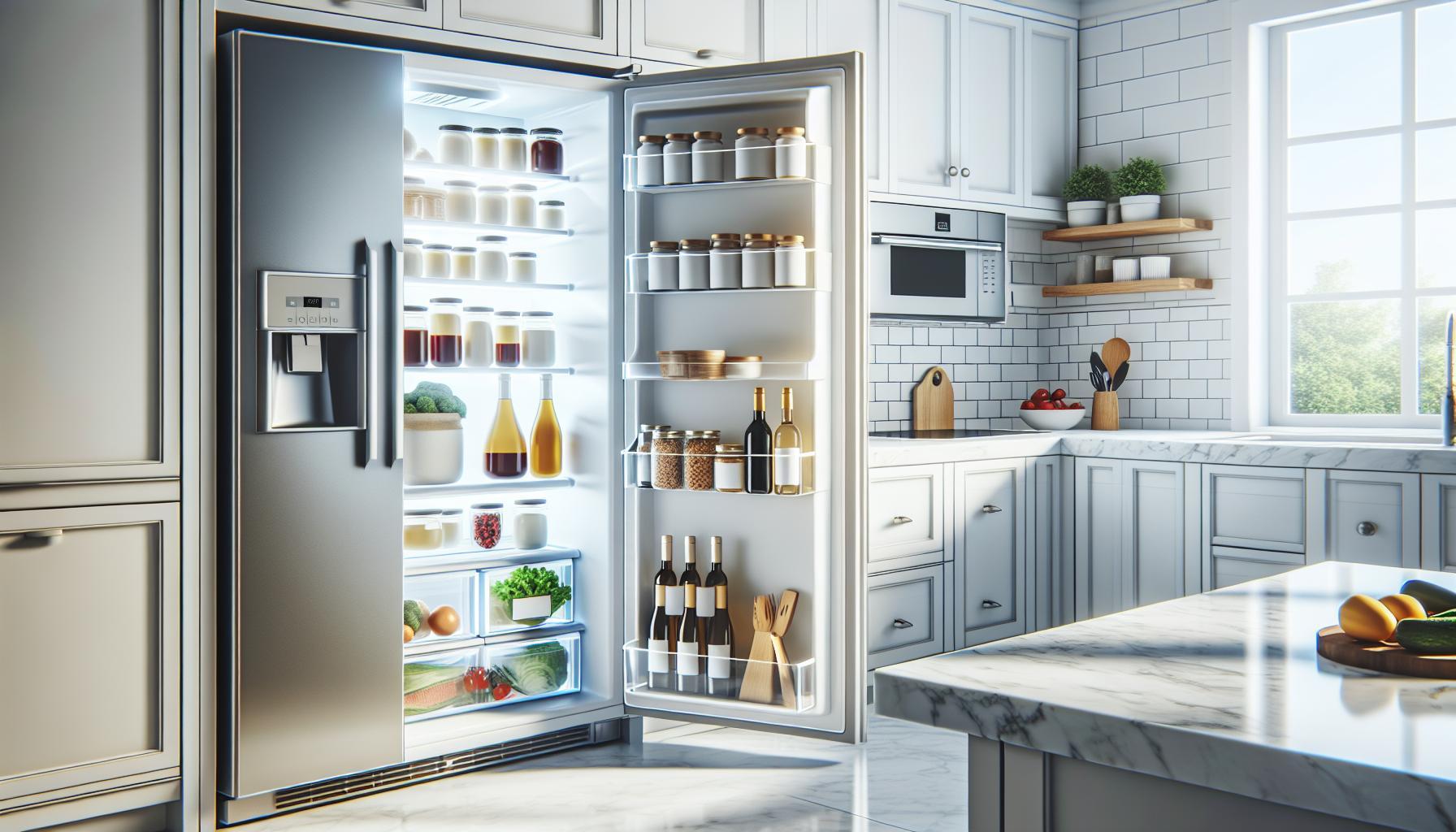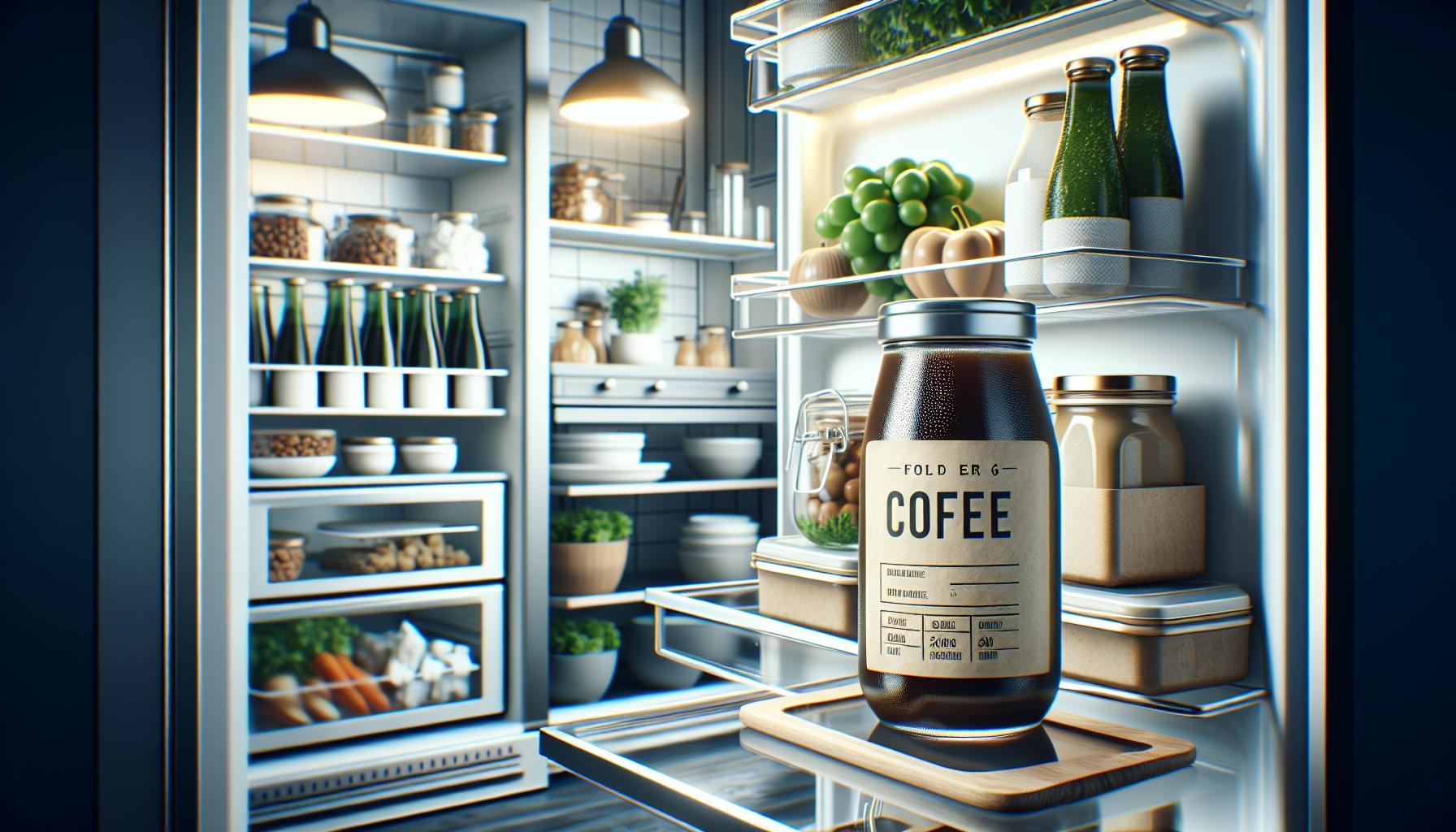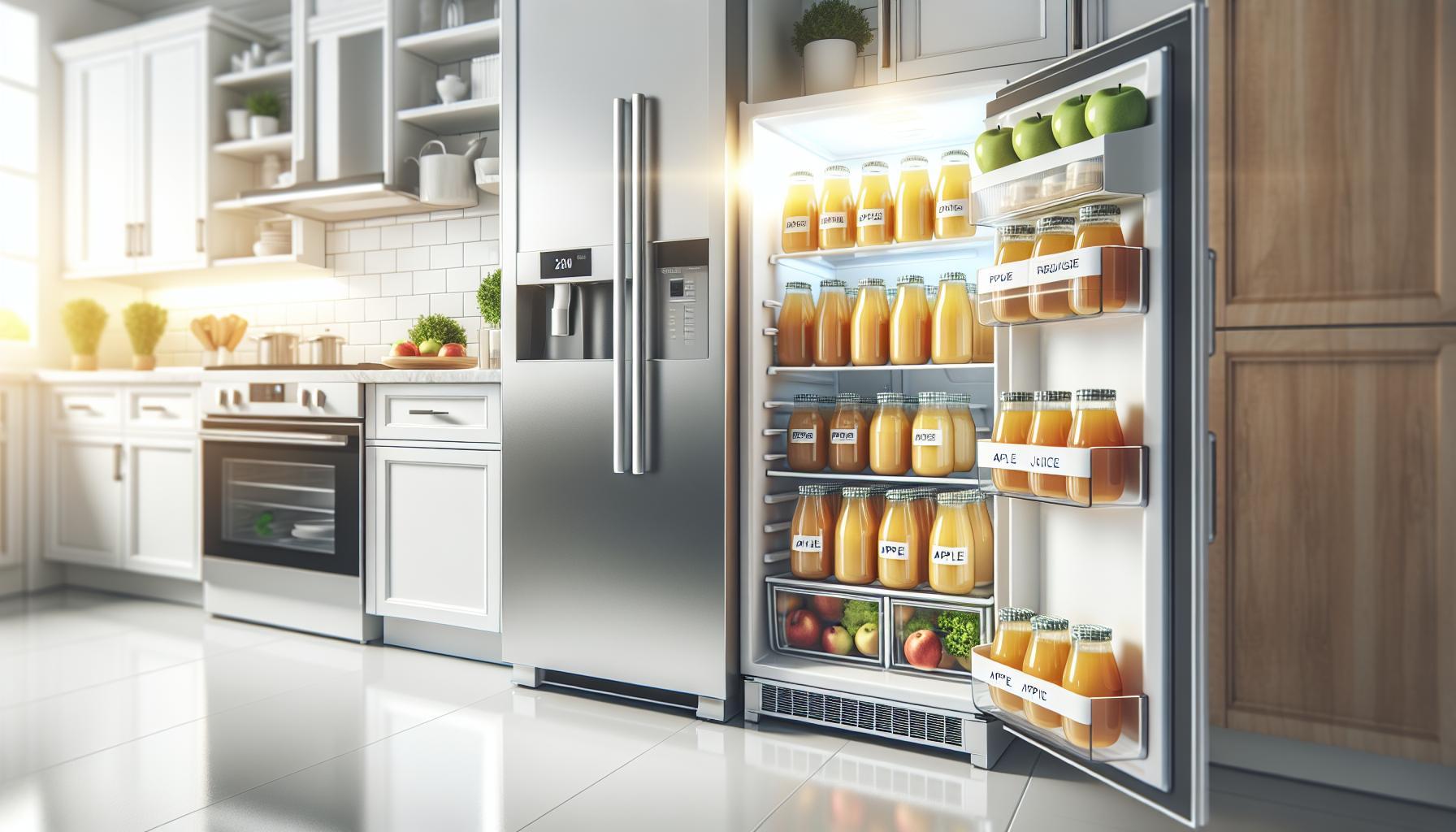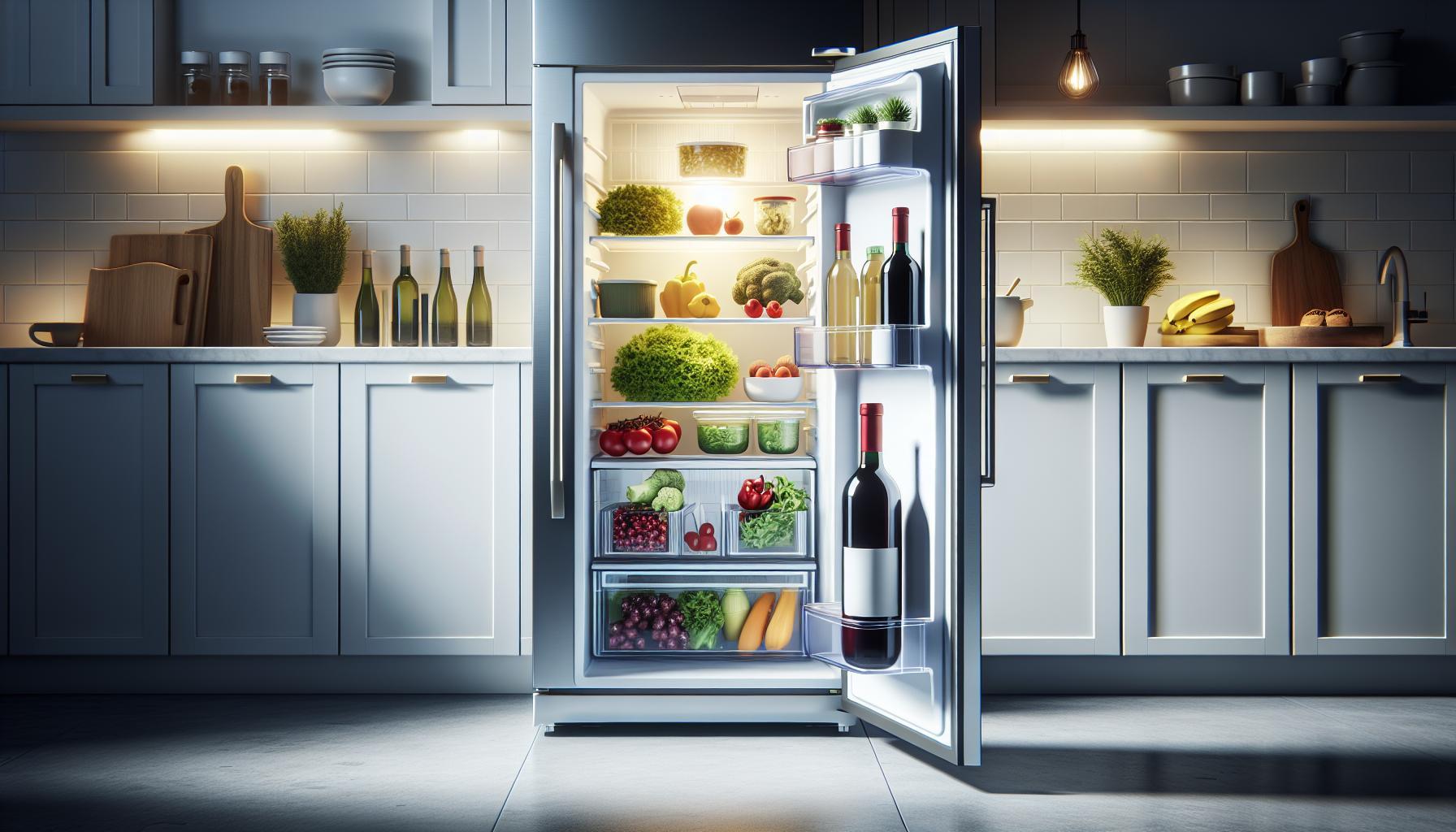Whether you’re sipping on a refreshing glass of lemonade on a hot summer day or serving it up for guests, knowing how long it lasts in the fridge is essential for maintaining its flavor and safety. Freshly made lemonade can brighten any occasion, but improper storage can lead to a loss of taste and potentially spoilage.
In this article, we’ll dive into how long your lemonade can stay fresh in the fridge, offering practical storage tips to ensure you enjoy it at its best. You’ll learn the signs of spoilage and safe practices to help you savor every delicious drop without any worries. So, let’s explore how to keep your lemonade vibrant and refreshing, turning that pitcher into a staple in your fridge rather than a fleeting summer treat!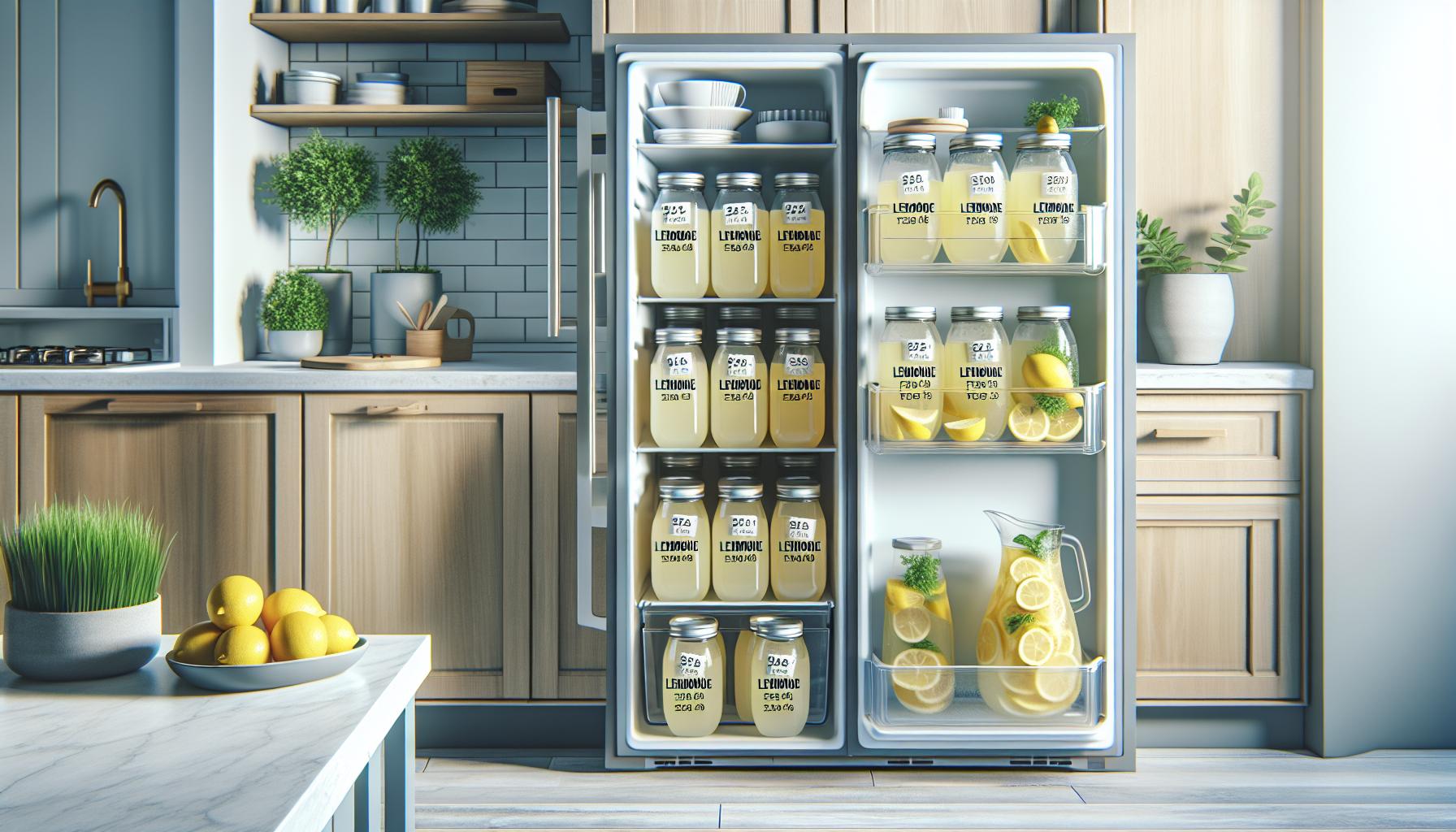
How Long Does Homemade Lemonade Last in the Fridge?
Homemade lemonade is a delightful refreshment, particularly during those hot summer days. However, if you’ve made a large batch, you may wonder how long it can safely be stored in the fridge. Typically, homemade lemonade lasts about 5 to 7 days when properly stored in an airtight container. The fresher the ingredients used, the longer your lemonade will generally last. It’s essential to keep it refrigerated and avoid leaving it at room temperature for prolonged periods, as this can lead to rapid spoilage.
To maximize the freshness of your lemonade, consider using a glass or plastic container with a tight seal. Glass is preferred because it does not absorb odors, which can sometimes occur with plastic over extended periods. If you notice any changes in color, flavor, or odor, it’s best to discard the lemonade.
In cases where you’re unsure about the lemonade’s condition, check for several signs of spoilage. If you observe any unusual sediment at the bottom, a change in smell to a sour or off odor, or if the taste has become overly bitter or fermented, these signals indicate that your lemonade has gone bad and should not be consumed. By adhering to these storage guidelines, you can enjoy your homemade lemonade while ensuring it remains refreshing and safe to drink for as long as possible.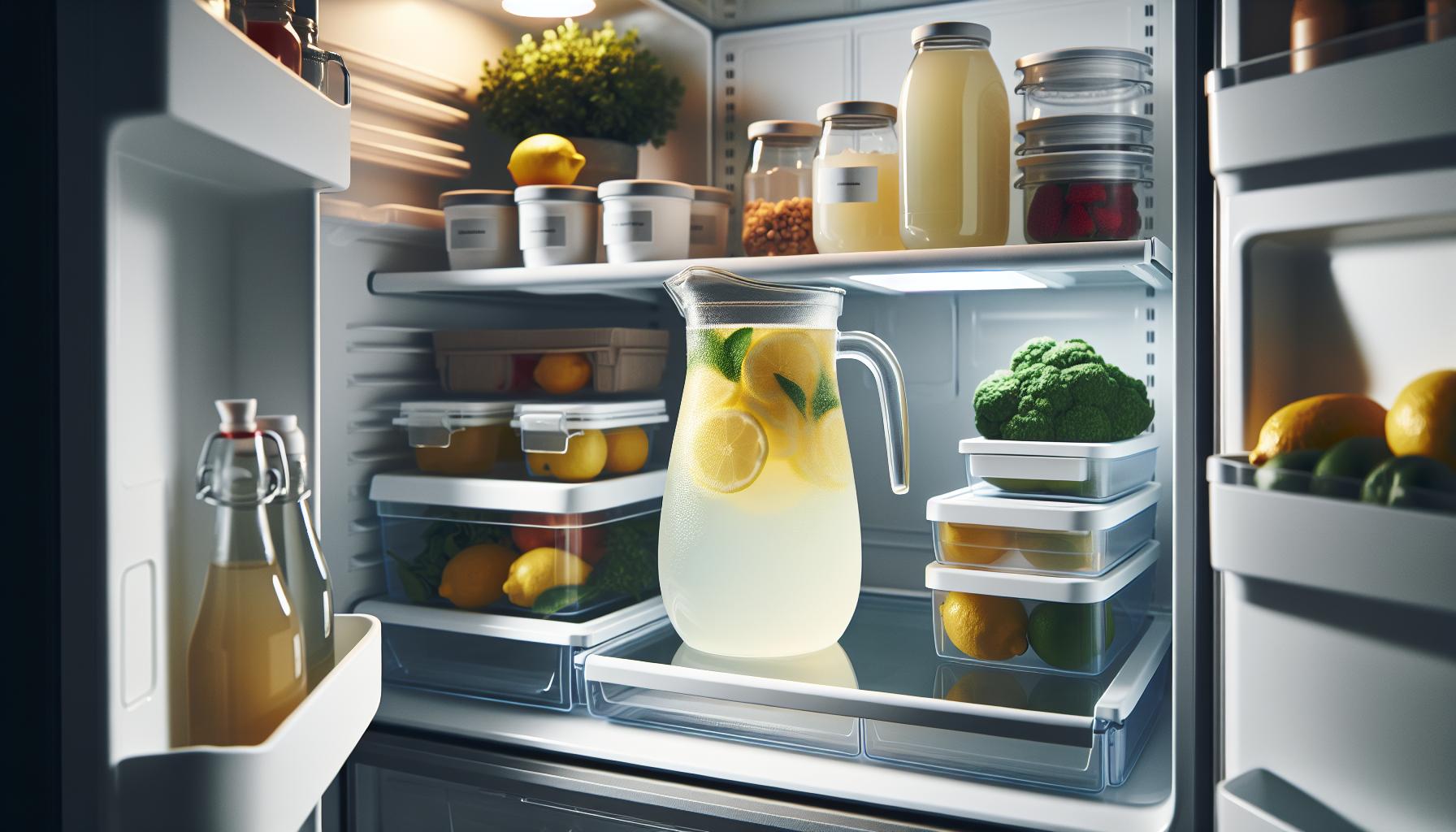
Signs Your Lemonade Has Gone Bad
If you’ve ever sipped on a glass of homemade lemonade, you know that its bright, zesty flavor is unbeatable. However, as delicious as it is, this refreshing beverage has a limited shelf life, and there are clear signs that indicate it has gone bad. Being aware of these warning signs can save you from unpleasant surprises and ensure your lemonade remains enjoyable and safe to drink.
One of the first indicators that your lemonade may have spoiled is a change in smell. Fresh lemonade should have a vibrant citrus scent; if you detect a sour or off-putting odor, it’s best to discard it. Additionally, pay close attention to any changes in appearance. If you see sediment settling at the bottom of your container or notice the liquid becoming cloudy, these changes can signal the presence of unwanted bacteria or fermentation. Lastly, tasting your lemonade is a crucial step. If it tastes excessively bitter, sour, or otherwise off compared to its initially refreshing flavor, it’s time to let it go.
When storing your lemonade, always keep an eye out for these spoilage signs. By recognizing them early, you can avoid consuming lemonade that is no longer safe. Taking a moment to inspect your drink before pouring a glass can ensure that you continue to enjoy that refreshing taste without compromising your health.
Storing Lemonade: Best Practices for Freshness
To maximize the freshness of your homemade lemonade, proper storage techniques are essential. Lemonade, while refreshing, has a relatively short shelf life even when refrigerated. Typically, homemade lemonade can last for about 5 to 7 days in the fridge if appropriately stored. To ensure you enjoy its delightful flavor for as long as possible, follow these best practices.
First and foremost, use an airtight container for storage. Glass jars or bottles with tight-sealing lids are ideal, as they prevent oxygen from entering and interacting with the natural ingredients, which can lead to spoilage. Avoid using metal containers, as they can impart unwanted flavors to your lemonade. Additionally, store the lemonade in the coldest part of your refrigerator, usually near the back, to maintain a consistent low temperature.
Keep your lemonade away from foods that emit strong odors, as it can absorb these scents, altering its taste. Furthermore, if you notice the lemonade beginning to look cloudy or sediment forming at the bottom of the container, it’s a sign that it may be on the verge of spoiling. Always inspect and smell your lemonade before consumption to ensure its freshness. Lastly, consider portioning out smaller amounts if you frequently find yourself with leftover lemonade. This way, you can minimize exposure to air and light, further extending its enjoyable life.
By being mindful of these storage practices, you can savor your homemade lemonade longer while maintaining its refreshing taste.
Keeping Store-Bought Lemonade Fresh Longer
To extend the life of store-bought lemonade, implementing effective storage methods is essential. While unopened bottles can last several months past their expiration date when kept in a cool, dark place, once opened, it’s crucial to pay attention to how you handle and store it. An opened bottle of lemonade should ideally be consumed within 5 to 10 days for the best flavor and quality.
Finding the right storage solution can make a significant difference. After opening, always transfer the lemonade into a glass container with a tight-sealing lid if the original packaging doesn’t allow for this. Glass is non-reactive and will help preserve the quality of the beverage without altering its taste. Additionally, store it in the refrigerator, ideally on the bottom shelf, where the temperature is usually the coldest. Keeping it away from the freezer compartment, where temperature fluctuations can occur, will help maintain a consistent environment.
Paying attention to the signs of spoilage is equally important. If you notice any changes in color or texture-such as cloudiness or sediment gathering at the bottom-these can indicate that the lemonade is no longer fresh. Always check for off-odors or an unusual taste before sipping, especially if it’s been in the fridge for more than a week.
Lastly, for long-term preservation without risking spoilage, consider freezing portions of lemonade in ice cube trays. This not only retains the flavor but also allows you to add a refreshing twist to cocktails or use it in other recipes without having to consume the entire bottle in a short span. When you need a refreshing drink, simply thaw the desired amount, and you’ll have a taste of summer ready to enjoy.
Impact of Ingredients on Lemonade Shelf Life
The ingredients in lemonade not only define its delightful flavor but significantly influence its shelf life. When crafting homemade lemonade, the primary components typically include fresh lemon juice, water, and a sweetener, but variations can also introduce other ingredients such as herbs, fruit slices, or carbonated water. Each of these ingredients affects how long your lemonade will remain fresh and tasty.
Fresh lemon juice, while packed with flavor, has a limited shelf life due to its high acidity. When combined with water and sugar, the sugar acts as a preservative, but the overall stability of your drink still hinges on the balance of these ingredients. Ideally, homemade lemonade should be enjoyed within 5 to 7 days when stored in the refrigerator. If you add fresh herbs like mint or rosemary, you might find that the shelf life decreases to about 3 to 5 days because the herbs can introduce a higher level of moisture and bacteria, accelerating spoilage.
It’s also essential to consider the type of sweetener used. Granulated sugar creates a stable environment for lemonade when dissolved properly, while natural sweeteners like honey or agave may introduce their own microbial activity, leading to faster fermentation. Avoiding any additives or preservatives found in commercial lemonades will typically mean a shorter shelf life for homemade versions, signaling the importance of careful ingredient selection.
For optimal longevity, maintaining the right storage conditions is crucial. Keeping lemonade in a glass container with a tight seal can prevent the entry of air, reducing oxidation and spoilage. It’s also advisable to keep your lemonade away from temperature fluctuations, such as those near the fridge door. Ultimately, understanding the impact of each ingredient allows you to enjoy your homemade creation longer while ensuring it remains safe and refreshing.
Can You Freeze Lemonade for Later Use?
Freezing lemonade is a fantastic way to extend its shelf life and ensure you always have a refreshing drink on hand. When done correctly, frozen lemonade can last for up to 6 months in the freezer without sacrificing quality or flavor. The freezing process helps to preserve the fresh taste of homemade lemonade, making it an excellent option for bulk preparation.
To freeze lemonade effectively, start by pouring your fresh lemonade into airtight containers or freezer-safe bags. If using bags, leave a little space at the top to allow for expansion as the liquid freezes. Be sure to label each container with the date and contents for easy identification later. For convenience, you might also consider freezing lemonade in ice cube trays, which allows you to use small portions for cocktails or quick drinks without thawing an entire batch.
When you’re ready to enjoy your frozen lemonade, transfer it to the refrigerator to thaw overnight, or use the microwave for a quicker option. If you’ve frozen it in ice cube form, pop a few cubes into a glass of water or soda to create a flavorful drink that won’t dilute the original flavor. A quick stir can help to revive the texture, and if you find that your lemonade has become slightly too icy, a brief blend can restore its original consistency.
Freezing is an excellent strategy not only for enjoying homemade lemonade at a later date but also for creating fun, refreshing summer treats such as slushies or lemonade popsicles. Embrace the flexibility of frozen lemonade and never let excess go to waste; your taste buds will thank you!
Tips for Reviving Stale Lemonade
Lemonade is a beloved beverage that, when made fresh, boasts vibrant flavors and a refreshing quality. However, if your homemade or store-bought lemonade has been sitting in the refrigerator for a few days, you might find it has lost that initial sparkle. Reviving stale lemonade isn’t just about masking its deterioration; it’s about restoring its inviting taste and ensuring you enjoy every sip. Here are some practical tips to breathe new life into your lemonade.
To start, consider rebalancing the flavor profile. Stale lemonade often has diminished sweetness and may taste flat. Adding a splash of fresh lemon juice can enhance its tartness and freshness. Additionally, a bit of simple syrup (sugar dissolved in water) can help reclaim that sweet taste. Begin with small quantities, mixing well, and tasting as you go to avoid overpowering the original flavor.
Another great way to revitalize stale lemonade is by adding fresh herbs. Mint, basil, or even rosemary can provide a delightful twist and a burst of aroma that elevates the drink. Simply muddle a few leaves in your glass before pouring in the lemonade, or let the herbs steep in the full pitcher for a few hours to infuse the flavors.
Lastly, transforming stale lemonade into a refreshing slush or cocktail can be a game changer. Pour stale lemonade into a blender along with ice and blend until smooth for a frozen treat that provides a new texture. For an adult version, consider adding a splash of vodka or gin along with some fresh fruit to create a lively cocktail. This not only revives the beverage but also makes it feel special and enjoyable again.
Incorporating these simple strategies not only extends the enjoyment of your lemonade but also minimizes food waste, allowing you to relish every drop.
Using Lemonade Beyond Refreshment: Creative Ideas
Using lemonade in creative ways can elevate your culinary adventures and reduce waste, all while keeping flavors fresh and exciting. Beyond serving it in a glass, consider integrating this zesty beverage into various recipes that will add zing and enhance meals.
One delightful use for lemonade is in marinades and dressings. The acidity in lemonade makes it a fantastic component for tenderizing meats while imparting a refreshing flavor. Combine equal parts lemonade and olive oil, season with herbs like thyme or rosemary, and let your chicken or tofu marinate for at least an hour before grilling. This simple technique not only infuses the protein with flavor but also keeps it moist during cooking.
Additionally, lemonade can act as a unique base for cocktails or mocktails. Blend it with fresh fruit like strawberries, blueberries, or peaches for a fruity punch that appeals to all ages. For an adult twist, consider mixing lemonade with spirits such as vodka, gin, or rum. Adding fresh herbs-like mint or basil-can also enhance the complexity of the drink. Experimenting with different mixers can create a signature drink for your next gathering.
Lemonade can also take center stage in desserts. Use it in cake batters to add an unexpected tang or create homemade lemon sorbet by freezing lemonade into a mixable texture. Simply pour lemonade into a shallow dish, freeze, and scrape it with a fork every 30 minutes until it turns fluffy and light. This can be an excellent palate cleanser between meals or a refreshing treat on a hot day.
For those looking to maximize their homemade lemonade, consider using it in popsicles. Fill molds with lemonade, adding pieces of fruit or herbs to enhance the flavor profile further. These make for a fun and refreshing snack that kids and adults will love on a sunny day. By thinking outside the traditional glass, you can explore countless savory and sweet possibilities that highlight the versatility of lemonade while also extending its lifecycle in your kitchen.
The Science Behind Lemonade Preservation
The ability to keep lemonade fresh hinges on a few scientific principles, particularly the roles of acidity, sugar content, and microbial growth. Lemonade, primarily composed of water, lemon juice, and sugar, relies on its high acidity to inhibit spoilage. The natural acidity from lemons (citric acid) helps create an environment that discourages the growth of bacteria and mold, contributing to a longer shelf life. When stored properly, homemade lemonade can last about 5 to 7 days in the refrigerator, while store-bought varieties often have preservatives that can extend this timeframe.
To maximize freshness, consider how you’re preparing and storing your lemonade. Use freshly squeezed lemon juice rather than bottled varieties, as it contains a higher concentration of citric acid and essential oils, both of which can influence flavor and preservation. After preparing your drink, store it in a clean, airtight container to minimize exposure to air, which can lead to oxidation and flavor degradation. Ideally, glass containers are preferable, as they don’t leach chemicals that might alter the taste.
Key Factors Affecting Preservation
- Acidity: The natural acid from lemons not only gives lemonade its tart flavor but also acts as a preservative.
- Sugar Content: Sugar can also help with preservation; however, too much can lead to fermentation if not stored properly.
- Temperature: Keeping lemonade at a consistent, cool refrigerator temperature slows down the growth of any spoilage organisms.
- Contaminants: Use clean utensils and containers to reduce the risk of introducing bacteria or mold.
If you notice changes in color, smell, or taste, it’s best to err on the side of caution. Signs of spoilage might include a strange odor or the presence of bubbles, indicating fermentation. Understanding these scientific principles and practicing careful storage can greatly enhance the enjoyment and longevity of your lemonade.
Safety Guidelines for Food Storage
To ensure the safety and quality of your homemade lemonade, adhering to proper food storage guidelines is paramount. Understanding that lemonade can harbor spoilage microorganisms if mishandled underscores the importance of maintaining cleanliness and appropriate storage conditions. After preparing your lemonade, it is essential to transfer it into a clean, airtight container. This practice not only preserves the drink’s freshness but also minimizes the risk of contamination from airborne bacteria or mold.
Refrigeration plays a critical role in extending the lifespan of your lemonade. It should be stored at a stable cold temperature, ideally below 40°F (4°C), as this inhibits the growth of harmful bacteria. If you expect not to consume the lemonade within a week, consider freezing it in ice cube trays for longer-term storage. Additionally, always label your containers with the date of preparation, enabling you to easily track freshness and avoid serving spoiled lemonade.
Another key safety measure is to always use clean utensils and containers when preparing and serving your lemonade. Avoid introducing potential contaminants by ensuring that everything coming into contact with your drink is either newly sanitized or thoroughly washed. If you notice any changes in smell, color, or the presence of bubbles, it is wise to discard the lemonade, as these are strong indicators of spoilage.
By following these straightforward safety guidelines, you can enjoy the refreshing taste of lemonade while minimizing health risks, ensuring its delightful flavor lasts as long as possible.
How to Make Shelf-Stable Lemonade
To create a version of lemonade that can withstand the test of time, you can follow a few straightforward methods that ensure it remains safe and flavorful for extended periods. Making lemon concentrate or using preservation techniques can significantly enhance the shelf stability of your lemonade, making it a great option for bulk preparation.
One effective method is to create a concentrated lemonade syrup. Start by combining a larger proportion of sugar to lemon juice and water, typically using a 2:1 ratio of sugar to lemon juice. For example, mix two cups of sugar with one cup of freshly squeezed lemon juice, then whisk until the sugar is fully dissolved. Boil this mixture for a few minutes to help dissolve any undissolved sugar and to pasteurize the liquid. Once cooled, transfer the lemonade concentrate into sterilized, airtight bottles. This concentrate can last up to six months when stored in a cool, dark area, like a pantry. When ready to drink, simply mix with water to your taste.
Another strategy is utilizing food preservation methods such as canning. After making your lemonade concentrate as mentioned above, pour the hot liquid into sterilized canning jars, leaving about half an inch of headspace at the top. Sealing the jars properly and processing them in a boiling water bath for about ten minutes can sterilize and create a vacuum seal that extends their shelf life. Properly canned lemonade can last for up to a year. Be sure to refrigerate after opening, consuming it within a couple of weeks to ensure it maintains its best taste and safety.
If you prefer a more straightforward approach, consider freezing your lemonade in ice cube trays. Once frozen, transfer the lemonade cubes to a sealed freezer bag, which can be kept for several months. This method is perfect for creating refreshing drinks as needed without preparing an entire batch each time.
In addition to these preparation methods, always ensure that you practice cleanliness when handling your ingredients and storage containers to avoid contamination. Using sanitized equipment and observing proper sealing techniques are crucial steps in the preservation process. This will help ensure that your shelf-stable lemonade remains fresh and delicious, ready to quench your thirst whenever desired.
Common Misconceptions About Lemonade Storage
Many people hold misconceptions about how to best store homemade lemonade, often underestimating its shelf life and the impact of proper storage techniques on freshness. One common fallacy is that lemonade can last indefinitely in the fridge. In reality, while homemade lemonade is generally good for about 5 to 7 days when stored in the refrigerator, its longevity can greatly depend on various factors, such as the ingredients used and how it is stored.
Another misconception involves the belief that all lemonade, whether freshly made or store-bought, should be treated the same way regarding storage. Store-bought lemonade often contains preservatives that allow it to last longer, typically retaining its freshness for several weeks in the fridge. However, it’s crucial to always check the expiration date on the packaging. Upon opening, it should be consumed within 7 to 10 days for optimal taste.
Additionally, many people think that once lemonade begins to taste off, it’s still safe to consume. This is not the case; if lemonade develops an unusual smell or flavor, it is best to err on the side of caution and discard it. The fact that lemonade is a mixture of sugar, water, and acids means it can still harbor harmful bacteria despite its acidic nature.
To further ensure freshness, it is beneficial to store lemonade in a sealed container to minimize exposure to air, which can lead to oxidation and spoilage. It’s also wise to store it in the back of the fridge, where temperatures are more stable, rather than in the door, where fluctuations occur more frequently. By avoiding these common misconceptions and applying thoughtful storage practices, you can enjoy your homemade lemonade at its best for longer.
Faq
Q: How can I tell if my lemonade has gone bad?
A: Signs that lemonade has gone bad include an off smell, unusual color changes, separation of ingredients, or a sour taste. If your lemonade has any of these characteristics, it’s best to discard it. For detailed signs, refer to the section on “Signs Your Lemonade Has Gone Bad” in the main article.
Q: What is the best way to store homemade lemonade?
A: To store homemade lemonade effectively, keep it in an airtight container in the fridge. This helps maintain its freshness for up to a week. Make sure to avoid exposure to air and light, which can degrade the flavor and quality over time. Check the “Storing Lemonade: Best Practices for Freshness” section for more tips.
Q: Can I extend the shelf life of store-bought lemonade?
A: Yes, you can extend the shelf life of store-bought lemonade by keeping it in the fridge and consuming it before the expiration date. Avoid leaving it out at room temperature for long periods. Refer to the “Keeping Store-Bought Lemonade Fresh Longer” section for best practices on storage.
Q: Is it safe to drink lemonade past its expiration date?
A: Drinking lemonade that is past its expiration date can be risky. It’s best to check for signs of spoilage before consumption. If it looks or smells off, it’s safer to throw it away. For more on safety, consult our “Safety Guidelines for Food Storage” section.
Q: How long can I keep opened lemonade in the fridge?
A: Opened lemonade can typically last about 5 to 7 days in the fridge when stored properly. Always use an airtight container to preserve freshness. For specific storage times, see “How Long Does Homemade Lemonade Last in the Fridge?” for more details.
Q: Can I add preservatives to homemade lemonade to make it last longer?
A: Yes, adding preservatives like citric acid or ascorbic acid can help extend the shelf life of homemade lemonade. However, it’s important to use them sparingly. Please check “Impact of Ingredients on Lemonade Shelf Life” for more information on ingredient effects.
Q: What are creative ways to use leftover lemonade?
A: Leftover lemonade can be frozen into ice cubes for summer drinks, used as a mixer in cocktails, or turned into lemonade popsicles. For more creative ideas, you may refer to the section “Using Lemonade Beyond Refreshment: Creative Ideas.”
Q: What temperature should lemonade be stored at for maximum freshness?
A: Lemonade should be stored at a consistent refrigerator temperature of 40°F (4°C) or lower to maintain freshness. For further information on storage practices, including temperature guidelines, review the “Storing Lemonade: Best Practices for Freshness” section.
To Wrap It Up
To ensure your lemonade maintains optimal freshness in the fridge, remember to store it properly and consume it within 5 to 7 days. Taking these steps not only safeguards your beverage but also enhances your enjoyment. If you’re curious about prolonging the lifespan of other beverages or exploring tips on efficient food storage practices, check out our guide on “How to Store Juice for Maximum Freshness” and “The Best Ways to Preserve Homemade Drinks.”
Don’t hesitate to share your thoughts or ask questions in the comments below-we’d love to hear from you! For more valuable content like this, consider signing up for our newsletter to stay updated on all things food safety and preservation. With the right knowledge, you can confidently enjoy your homemade lemonade and avoid any waste. Keep exploring, and let us help you make the most out of your kitchen creations!

